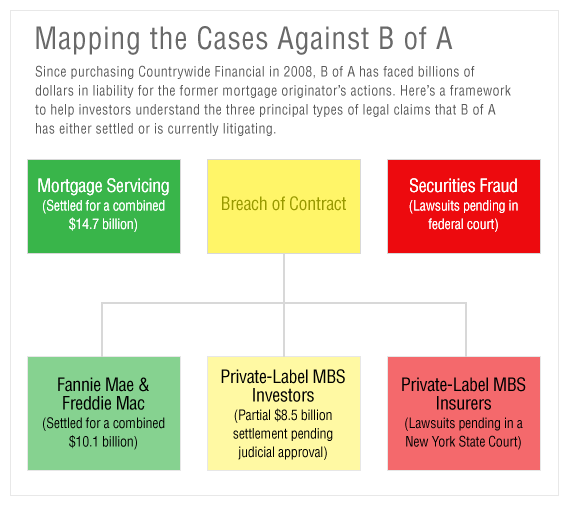This is the third in a series of five articles covering Bank of America Corp (NYSE:BAC)‘s legal problems since the financial crisis. Click here to read the first installment, and here to read the second installment.
Don’t believe what the media says about Bank of America Corp (NYSE:BAC) or its CEO Brian Moynihan. Is he a bit monotone in media appearances? Perhaps. A smidge boring? Sure. But inept? Certainly not.

Putting the monoline claims into perspective
If the number of lawsuits filed against B of A resembles an unsolvable puzzle, here’s a simple framework to keep in mind. The bank faces liability under three legal theories:
1). Breach of contract
2). Securities fraud
3). Malfeasance in mortgage servicing
The breach of contract claims can be further broken down into:
1). Those involving mortgages sold by Countrywide to government-sponsored agencies Fannie Mae and Freddie Mac.
2). Those involving private institutions which invested in Countrywide’s mortgage-backed securities (MBS).
3). And, those involving monoline insurance companies that insured particular tranches of the private-label MBSes.
What we’re concerned about here are the claims in the third category — the vast majority of which are tied up in a New York state court.

As a group, the monoline claims are the least alarming when it comes to monetary damages. To put them in perspective, between 2004 and 2008, Countrywide sold $846 billion worth of mortgages to Fannie Mae and Freddie Mac, $111 billion of which have since either defaulted or are severely delinquent — that is, they’re more than 180 days past due. Over the same time period, the mortgage originator packaged $716 billion worth of mortgages into hundreds of MBSes that were sold to private investors. A cool $190 billion of that group have defaulted or are severely delinquent. By comparison, according to B of A’s third-quarter 10-Q filing, Countrywide sold only $184.5 billion of the loans originated between 2004 and 2008 into monoline-insured securitizations, $52.6 billion of which are now in default or severely delinquent.
As they say, a picture is worth a thousand words, and when we stack up the three groups, it’s easy to see the disparity.

Source: Bank of America’s 3Q12 10-Q, pages 65-66.
This isn’t to say that monoline claims don’t cause sleepless nights for B of A executives — the damages will unquestionably amount to billions of dollars. Even more worrisome is the possibility that any of a number of critical legal issues in these cases will be decided against B of A. Those decisions could then go on to influence the outcome of parallel lawsuits, and even incentivize new counterparties to sue.



